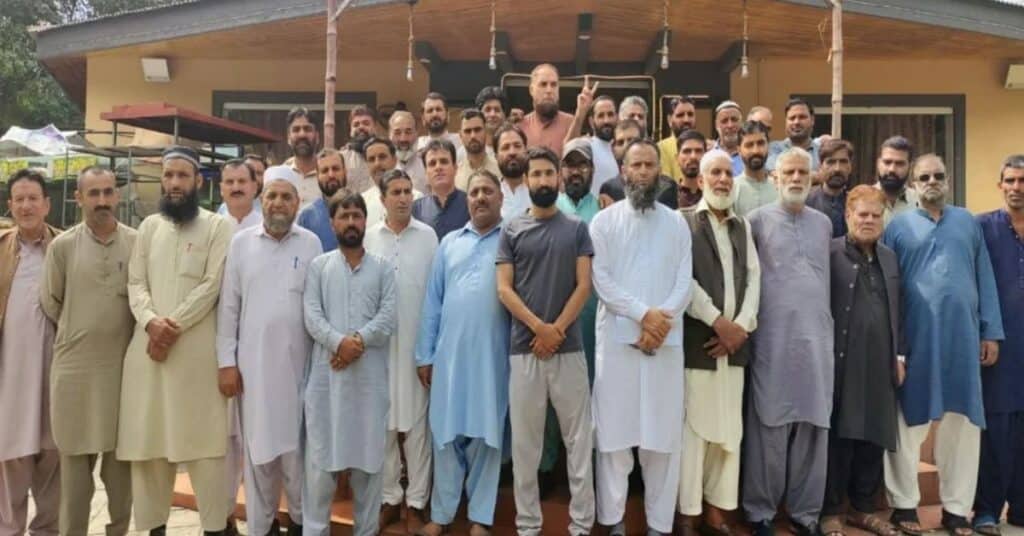MUZAFFARABAD (Kashmir English): The post-1989 migrants from across the Line of Control (LoC) have announced to challenge the AJK High Court decision of abolishing quota system, in the Supreme Court.
An emergency meeting of the refugees was held in the capital on Tuesday who announced to challenge the High Court’s decision in the Supreme Court.
The meeting discussed in detail the problems faced by the refugees, the Charter of Demand, the judicial decision on the 6% quota, and the Government policy towards the refugees.
The participants of the meeting regretted that Kashmiri refugees were being exploited in the base camp even under a plan. They observed that Government of Azad Kashmir was deviating from its constitutional and legal responsibilities and is writing a dark chapter by depriving refugees of their basic rights.
The speakers said that in the base camp, established in the name of the Kashmir freedom movement, the heirs of martyrs, Ghazis, and refugees are forced to live a life of destitution.
Despite a budget of Rs310 billion, Kashmiri refugees are not getting their basic rights and facilities.
The meeting warned that if the government does not immediately resolve the issues of Kashmiri refugees according to the Charter of Demand, including an increase in monthly living allowance, financial assistance for resettlement, restoration and implementation of the 6 percent quota, and domicile, thousands of refugees will be forced to take to the streets for their rights, and the Government of Azad Kashmir will be responsible for all its consequences.
It was decided in the meeting that the decision of the High Court’s single-member bench would be challenged in the Supreme Court. Furthermore, they said, peaceful struggle will be intensified for the protection and rights of 46,000 refugees.
The meeting was attended by Uzair Ahmed Ghazali, Gohar Ahmed Kashmiri, Raja Main Arif Khan, Chaudhry Muhammad Mushtaq, Ghulam Hassan Butt, Chaudhry Ferozuddin, Chaudhry Muhammad Ismail, Raja Zakheer Khan, Muhammad Iqbal Mir, Iqbal Yasin, Syed Hamza Shaheen, Siddique Dawood, Sir Andaz Mir, Imtiaz Ahmed Butt, Usman Ali Hashim, Nazimuddin Sheikh, Anzar Butt, Ashfaq Lone, Khawaja Muhammad Iqbal, Muhammad Younis Mir, Bilal Ahmed Farooqi, Irfan Ahmed Butt, Manzoor Iqbal Butt, Faisal Lone, Secretary Muhammad Ismail, Haji Rangeel Butt, Munir Ahmed Abbasi Alam Mughal, Naseer Ahmed Khan, Mushtaq Ahmed, Faisal Farooq, Chaudhry Abdul Shakur, Bashir Khan, Abdul Samad Butt, Abdul Rashid Turk, Tanzeer Iqbal, Ishtiaq Liaqat Awan, Mahfooz Inqilabi, Sardar Khurshid, Amir Abbasi, as well as members of the working committee, presidents of refugee settlements, and elected councilors.
High Court decision on quota system
In a landmark verdict, the AJK High Court on Monday struck down the decades-old quota system in AJK government services and professional colleges, declaring it unconstitutional and discriminatory.
Justice Sardar Muhammad Ejaz, sitting as vacation judge, authored the judgement on a batch of six writ petitions instituted between 2016 and 2025, which were cconsolidated due to their common questions of law.
The earliest petition filed in January 2016 by senior lawyers, including Amjad Ali Khan and others, had sought annulment of the 25 percent quota in civil services reserved for refugees from Indian-occupied Kashmir settled in Pakistan, 6 percent of which was later apportioned for post-1989 refugees.
The most recent petition was instituted in January 2025 by Raja Arbab Zaheer, challenging recruitment for section officers. The 2022 and 2024 petitions were also against quota-based appointments and admissions in medical and higher education institutions.
In a detailed 65-page judgement, the High Court declared that all notifications and rules enforcing quotas in government services and professional institutions were “repugnant to the AJK Interim Constitution, 1974, violative of fundamental rights, and against the injunctions of Islam”.
Justice Ejaz observed that the fundamental rights enshrined in Article 4 — particularly the rights to equality, freedom of profession, and safeguard against discrimination in services — guaranteed that all State Subjects must be treated equally and allowed to compete on merit.
“Any job, post or educational seat created from the public exchequer is a trust which must go to the most deserving candidate,” the High Court verdict read.
It noted that under the Constitution, no State Subject eligible for appointment could be discriminated against on the basis of “race, residence, caste, sex, or place of birth.”
The court acknowledged that successive governments had periodically extended the quota system through notifications — beginning in 1972 and continued in 1980, 1987, 1996, 2001, 2005, 2009, 2013, 2016, 2018 and 2021 — but ruled that such extensions were contrary to constitutional provisions.
It stressed that while para-6 of the 2013 notification suggested a transition to open merit after a grace period, the government had failed to implement it.
Rejecting objections that some petitioners lacked locus standi, the bench held that lawyers, students, and citizens could approach the court to protect fundamental rights of State Subjects.
While setting aside the quota system, the judgement acknowledged only one exception: the government could lawfully fix a quota for disabled persons, as envisaged under law, but in all other cases “appointments and admissions must be made strictly on open merit.”
Justice Ejaz held that the purpose of creating posts was not to distribute jobs but to enhance departmental efficiency.
“If more competent persons are inducted through open competition, public institutions will perform better, and society at large will benefit,” he remarked.




